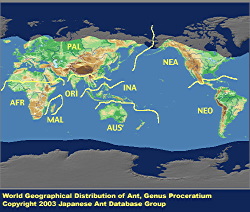
|
genus
|
Proceratium
|
 |
Japanese Name
|
Kagibara-ari-zoku
|
Original Reference
|
|
Roger, J. (1863) Die neu aufgefhrten Gattungen und Arten meines Formiciden-Verzeichnisses, nebst Ergnzung einiger frher gegeben Beschreibungen. Berliner Entomologische Zeitschrift 7: 131-214.
|
Synonym
|
|
Sysphingta Roger, 1863,
Sysphincta [sic]: Mayr, 1865,
|
Description
|
|
Eyes reduced, usually with only a few facets; situated on the sides of the head behind its midlength. Antennae 12-segmented, not forming a club. Anterior margin of clypeus not covering mandibles, even when protruding anteriorly; the degree of clypeal projection varies interspecifically. No sutures on dorsum of mesosoma. Petiole varying in form between species; its structure important for species-level identification. Gaster of peculiar form; the tergites of its larger segments (true abdominal segments IV and V) swollen and curved, so that the gastral apex is turned downwards and directed anteroventrally.
|
|

|
Remarks
|
|
Ants of this genus nest in rotting logs and other fallen decaying wood, decomposing stumps etc, or in the soil. They are usually active beneath the ground, and prey on the eggs of centipedes and spiders. According to Brown (1958b; 1980), these are sometimes stored in their nests. Masuko (1981) reported that the bent gaster aids the handling of spherical food eggs. About 30 species of Proceratium are known from temperate and tropical areas of the globe. Four are present in Japan. Onoyama & Yoshimura (2001) have given detailed descriptions and scanning erectron micrographs for the four species. All are relatively rare.
|
References
|
|
- Reise der
sterreichischen Fregatte Novara um die Erde in den Jahren 1857, 1858, 1859, unter den befehlen des Commodore B. von Wllerstorf-Urbair. Zoologischer Theil. Formicidae: 119 pp. Wien.
- Brown, W. L., Jr. (1958b. ). Contribution toward a reclassification of the Formicidae II. Tribe Ectatommini. . Bull. Mus. Comp. Zool. Harvard, 118, 173-362.
- Brown, W. L., Jr. ,1980
- Masuko, K. (1981). Predatory behavior of some forest floor dwelling ants. . Insects and Nature, 16(3), 19-25. .
- Onoyama, K. & Yoshimura, M. 2002. The ants of the genus Proceratium (Hymenoptera: Formicidae) in Japan. Entomological Science, 5: 29-49.
|
Editor
|
|
Original text by Keiichi Onoyama and Kazuo Ogata. Revised by Masashi Yoshimura. English translation by Keiichi Onoyama, edited by Robert W. Taylor.
|
|